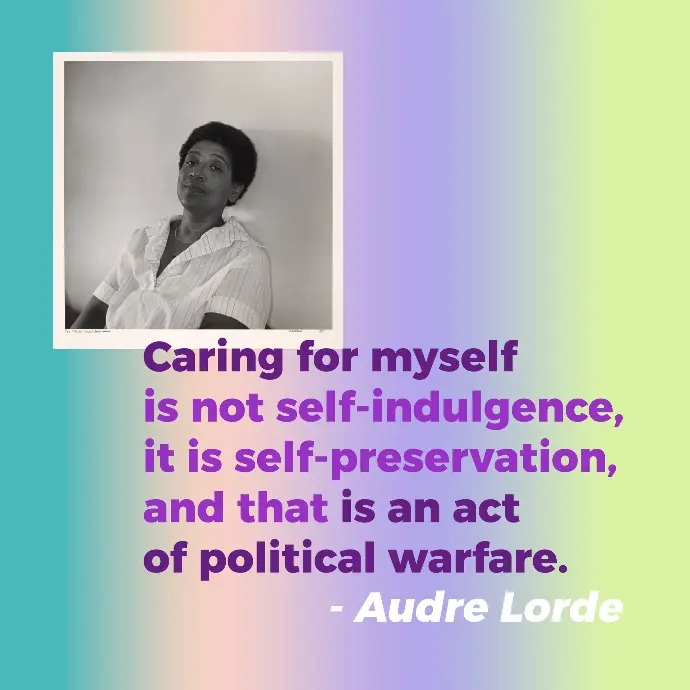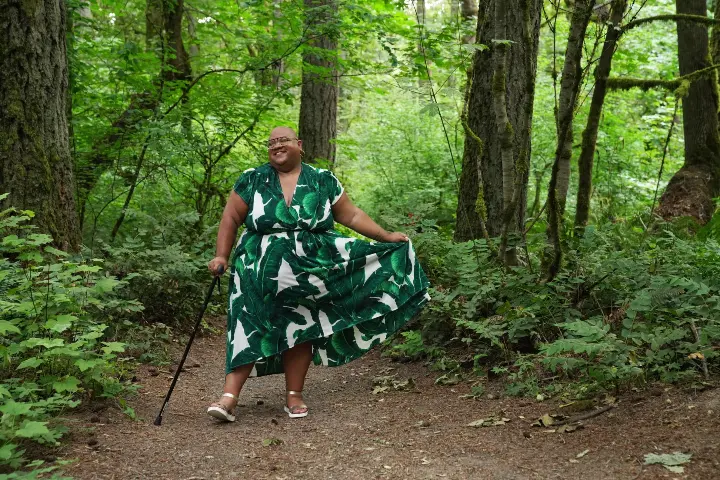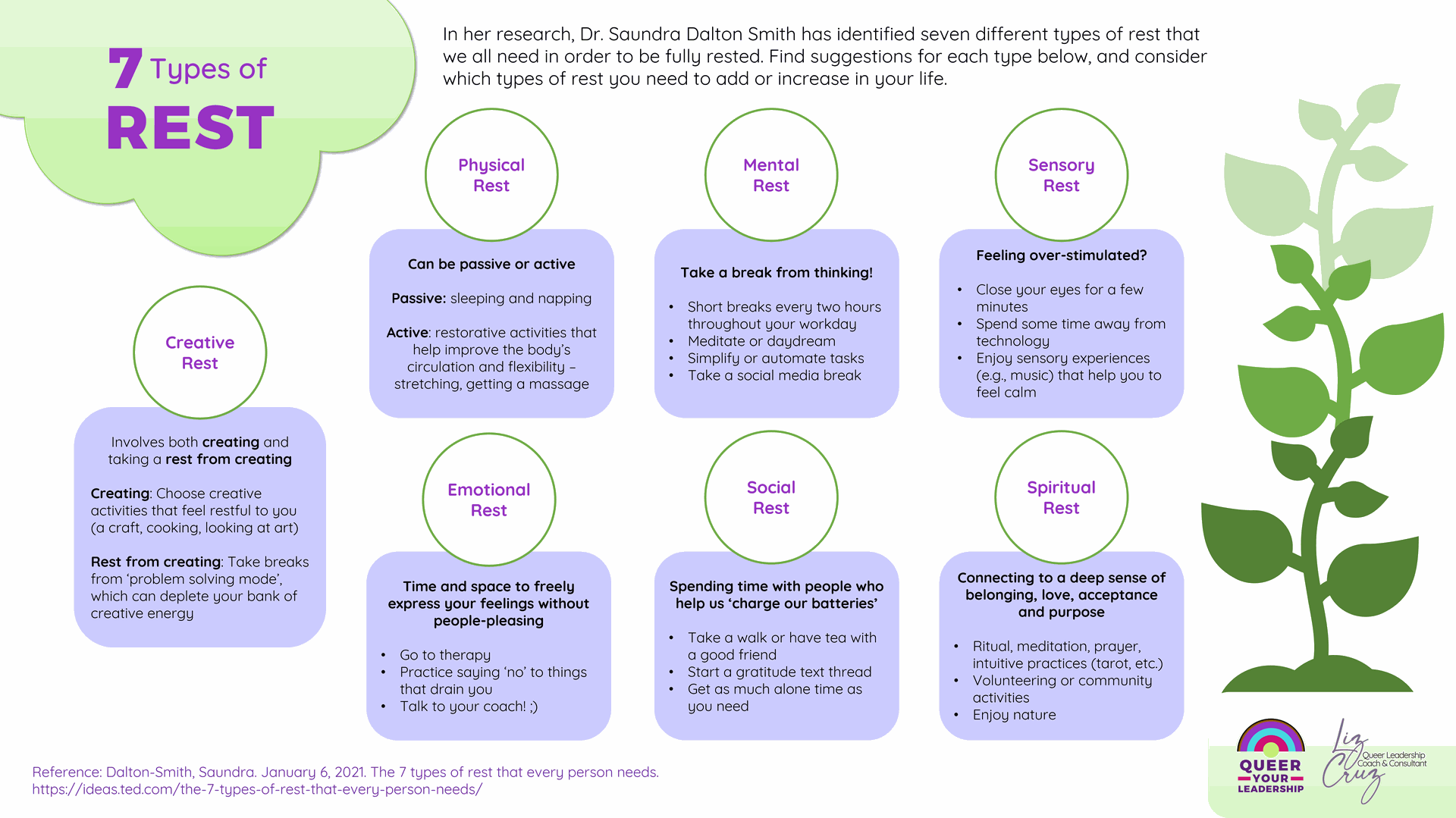You deserve to have a self-care routine you love
Picture this: You know how powerful and effective goal setting is. So, you write out a goal to become more comfortable presenting in leadership meetings. You feel excited and motivated. You tell yourself that since you wrote out that goal that this is the year, you’re gonna do it and meet 👏🏼 that 👏🏽 goal 👏🏿.
Except six months have gone by and your hands are still shaking, and you’re sweating before you give that corporate presentation. What happened? Did you forget to work on that goal? Did you not focus on it?
You thrive in the career path you’ve chosen. You know the work that you do makes a difference in the lives of the LGBTQ+ community and beyond. Your team looks up to you. They value your guidance and team-building mentality. You’re everyone’s go-to for questions and problem-solving.
But what are you doing that’s specifically for you? How are you engaging in self-care when you’re not at work, attending a conference, or setting your next queer leadership development goals?
I’ve been where you’re at. I spent YEARS of my life (and my career) chasing my next accomplishment or opportunity to people-please everyone around me. But I learned the hard way that my perfectionism would ultimately leave me miserable, anxious, and burned ALL the way out.
When I got real with what I actually wanted and needed, I was able to focus more on what was best for me. And I want to show you how you can do the same. Self-care is now an integral part of my daily routine. This blog post will show you how it can be part of yours, too.
Because LGBTQ+ leaders like you deserve to rest, replenish your energy, and get the most out of life.
So come along with me and learn about what self-care is, why it’s so important, and how you can create a self-care routine that works for you. And after you’ve read, leave me a comment about what self-care practices you like to engage in the most.

Citation for photo in graphic: The Miriam and Ira D. Wallach Division of Art, Prints and Photographs: Photography Collection, The New York Public Library. (1987). Audre Lorde. Staten Island, NY. Retrieved from https://digitalcollections.nypl.org/items/5e66b3e8-cd03-d471-e040-e00a180654d7
A brief history of self-care
You see posts all the time on social media about self-care. It’s a topic that almost everyone’s talking about. According to Ubersuggest, the phrase “self care” gets approximately 74,000 searches a month. People are starting to put more value on the aspects of self-care like rest and physical activity. And it’s for good reason. But where did the term come from? [1]
The term ‘self care’ originated in the 1950s. Healthcare practitioners in the mental health field made recommendations to patients to engage in self-care practices to improve their health.
Then in the 60s, 70s, and 80s, self-care gained more traction. Black leaders began using the term to talk about how to take care of themselves amidst civil rights protests. This blog from Silk and Sonder features a quote from Audre Lorde (self-described “Black, lesbian, mother, warrior, poet,” leader who spent her life raising hell against injustices of all sorts) that guides the way I view self-care: “Caring for myself is not self-indulgence, it is self-preservation, and that is an act of political warfare.” [2]
Y’all! Self-care isn’t selfish- it’s necessary for our mental health, and a critical component of our resistance to cis heteropatriarchal white supremacy culture. Keep reading to learn more about what self-care is and ideas for how we can get the deep restoration we need.
What is self-care and what does it mean for leaders?
I’m all for a moisturizing face mask. And trust me, I think indulging in an essential oil bubble bath sounds luxurious. But what self-care really is is all the things that we do to make sure that we have our own care needs met. And that can look different for everyone– so let’s dig a little deeper.
I want to remind you that you are worthy of the time you spend on your self-care routine. Whether it’s in the morning after you get your kids on the bus for school, midday between meetings with clients, or in the evening before you settle in to spend time with a partner of yours, you deserve to carve out time for self-care. Too often we derive our value from our work. Systems like capitalism and white supremacy culture put us in cycles of perfectionism. And they ultimately lead us to burnout.

Photo from Disabled and Here Collection
That’s why I value KC Davis’s take on how care tasks are meant to support us. I like how she reframes thinking about taking care of cleaning your house, doing your dishes, or getting laundry done into doing those things to take care of yourself. It changes the narrative from something you have to do to fit society’s standards and keep up, to something you choose to engage in as a way to show up for yourself. [4]
I love working with my clients to improve their self-care routines. Here are some questions we work through during Queer Your Leadership sessions that you can ask yourself:
- Imagine that you’re completely and beautifully taken care of. What would that feel like?
- What are some things that give you those feelings now?
- What are the things you might add in or stop doing to better support yourself this week?
I recommend taking the time to think through those questions. Remember that it’s okay to start small when making self-care goals or changes in your routine. And keep in mind that you don’t need to ‘earn’ a break. Your choice to engage in self-care is one of the best ways to build yourself up as a leader.
What does it mean to get the rest we need?
My team and I recently led a workshop on self-care for leaders. I was surprised to learn that many of our participants didn’t equate rest with replenishment. Rest is all about replenishing our energy when it’s depleted, and that goes beyond just sleeping or napping, because sleep is not the same thing as rest. If you’re someone who wakes up morning after morning saying something like “I got my 8 hours of sleep… so why do I still feel exhausted?” then you know what I mean.
Did you know there are seven types of rest? When I first heard Dr. Saundra Dalton-Smith’s TedTalk, her work blew my mind. The 7 types of rest she says we all need are physical, mental, creative, emotional, sensory, social, and spiritual. We all need these 7 types of rest to fully replenish our energy and fortify ourselves as leaders. It’s why I choose to fill my time with things like going on walks, gardening, and gathering with my closest confidants.[3]
Next time you find yourself feeling depleted, try this:
- What’s been going on that has me feeling depleted?
- What particular types of energy feel low right now?
- What activities would help me to replenish that energy?

If you’re exhausted after being in meetings all day, you might need some social rest. (Say hey, fellow introverts!) If you’ve been doing analytical work all day, you might need some creative rest - an art project, cooking, whatever helps you to feel playful. And if you’re simply TIRED OF CAPITALISM, it might be helpful to connect with your spiritual side or do something that brings you true joy.
As leaders, it can be challenging to make room in our schedules for ourselves to do the essentials. But self-care is a necessary practice that impacts your life and the way you show up as a leader.
Conclusion
Self-care isn’t just another trend. It’s more than something fun to do for yourself every once in a while. It’s a practice that deserves attention.
When we think about what lessons we can learn from Black activists who led civil rights movements, we can find ways to take better care of ourselves. Allowing ourselves to do that creates space in us to best take care of the people around us. We can fortify ourselves as leaders by choosing to value and incorporate self-care as part of our routines.
Leave a comment below about your current favorite part of your self-care routine. I want to create a dialogue for queer leaders looking to support each other’s growth and self-care journeys.
See you in the comments. 💜
Links to References
[1]https://app.neilpatel.com/en/ubersuggest/overview?lang=en&locId=2840&keyword=self+care
[3]https://ideas.ted.com/the-7-types-of-rest-that-every-person-needs/
[4]https://www.strugglecare.com/